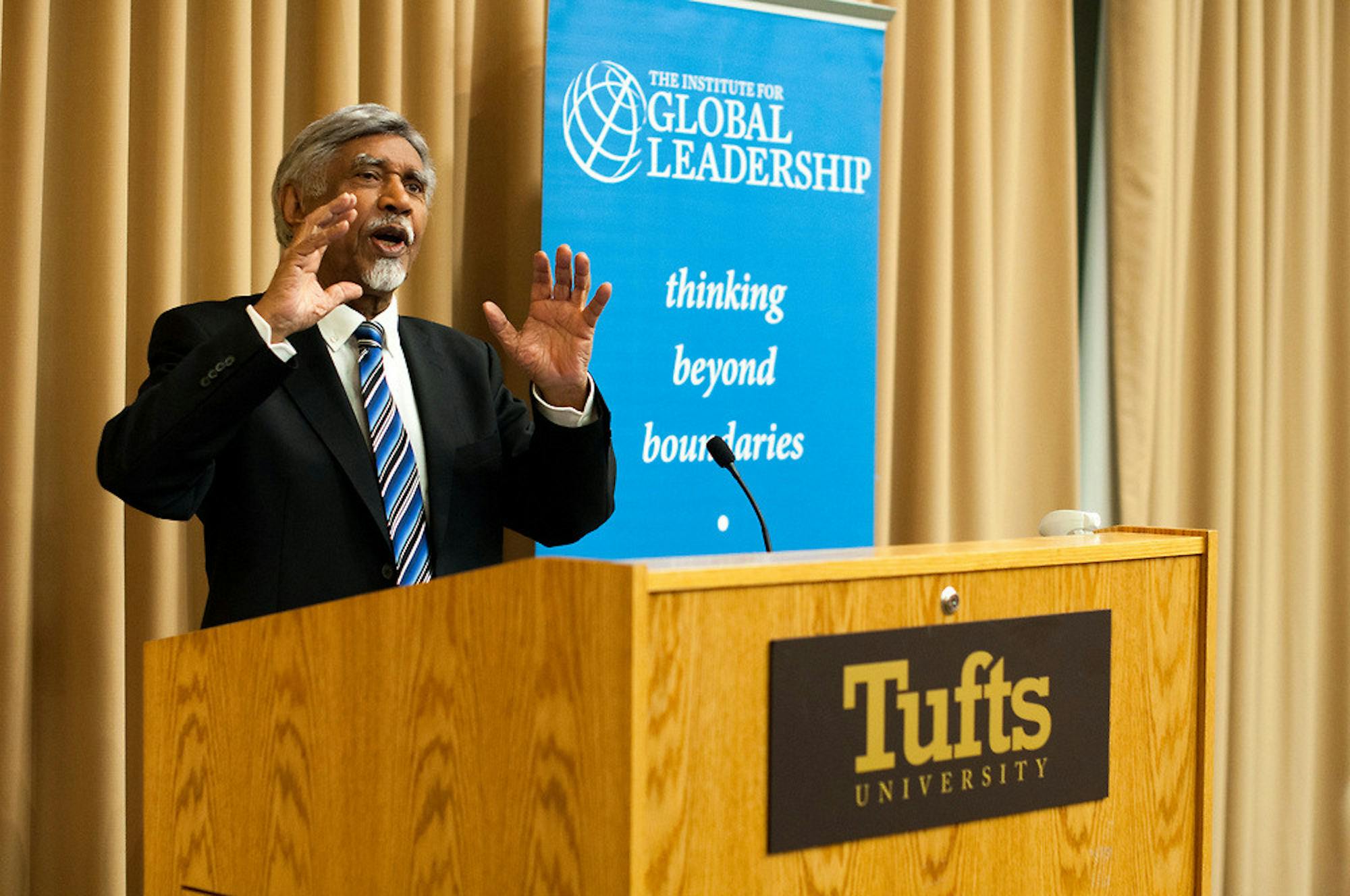Mac Maharaj, a central figure in the journey to end of apartheid in South Africa in the 1980s and 1990s, spoke about his observations from the struggle to bring peace to his country at an event on Thursday night. Maharaj also received the Robert and JoAnn Bendetson Public Diplomacy Award, an honor given through the Institute for Global Leadership (IGL).
Uzair Sattar, a first-year member of the IGL’s Education for Public Inquiry and International Citizenship (EPIIC) colloquium, presented Maharaj with the award. Sattar said the award recognizes people who have distinguished themselves in efforts to address global inequalities. Past winners include President Masoud Barzani of the Kurdistan Region of Iraq and Ambassador Daniel Feldman, the highest ranking state department official for Afghanistan and Pakistan during President Barack Obama's administration.
Maharaj spoke as part of the Robert and JoAnn Bendetson Public Diplomacy Initiative, which aims to bring key global policymakers and officials to speak at Tufts. The event was cosponsored by the Peace and Justice Studies Program, The Africana Center, The Fletcher School of Law and Diplomacy and the International Relations Program.
University President Anthony Monaco began the presentation, welcoming those in attendance. Monaco praised Maharaj, calling him “an inspiration for all of us to find productive paths forward.” Monaco's remarks were followed by an introduction by IGL Director Abi Williams.
Maharaj helped lead the African National Congress (ANC) alongside Nelson Mandela while the group fought for democracy in South Africa. Ultimately, Maharaj served as a negotiator for the group in the talks with South Africa’s National Party government that led to the nation’s transition from apartheid. Later, Maharaj served as minister of transport under Mandela’s administration, and then as President Jacob Zuma’s official spokesperson.
During this event, there was not any mention of the allegations that Maharaj engaged in corrupt practices while working for the Ministry of Transport, accepting payments from a businessman linked with a defense company interested in contracts with the department, as reported in South African newspaper Mail & Guardian.
Maharaj's lecture was built around nine “propositions," and sought to explain the difficulties in achieving peace and democratic governance in South Africa.
Maharaj’s first proposition was the idea that ending apartheid was an act of justice. He reasoned that, because apartheid was a crime against humanity, ending it constituted an acknowledgment of its wrongs.
Second, he addressed the violence committed by the ANC. He said that it was necessary because of the apartheid state’s rejection of negotiation.
“The ANC went to war in order to make peace,” he said.
Maharaj then acknowledged the importance of Nelson Mandela’s decision to request negotiations and his skills in the peacemaking process.
"[Mandela] blinked first in a way that shielded both [the ANC and the Apartheid State] from a charge of being weak-kneed,” he said, opening the door to negotiations.
In his sixth proposition, Maharaj described the importance of the ANC’s early move to plan a democratic South African constitution, allowing the newly forming nation the ability to garner domestic and international support.
The final three propositions of Maharaj’s lecture dealt with the difficulty in moving on from the atrocities of apartheid that were committed on both sides of the conflict. He argued that, as difficult as it may be, progress can only be achieved if both parties can try to find a way to come to terms with the past.
He praised one of the ANC’s solutions to this problem — the creation of the Truth and Reconciliation Commission — which sought to reveal crimes that took place and gain closure for the events of the conflict, rather than exact retributive justice.
“The way forward to heal our society was to make ourselves aware of what happened,” he said.
Maharaj conceded that this quest for truth has had mixed success, but that it is an ongoing process.
He ended his lecture by addressing the crowd directly.
“I urge you," he said, "pursue peacemaking, pursue justice."






